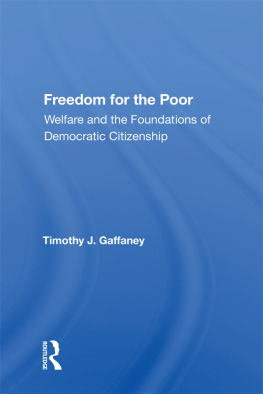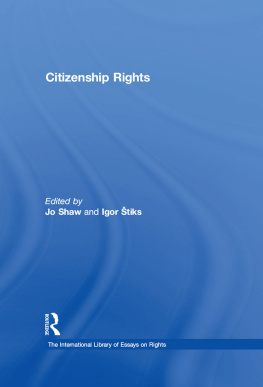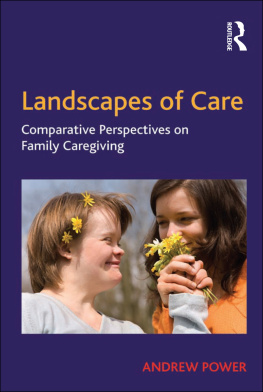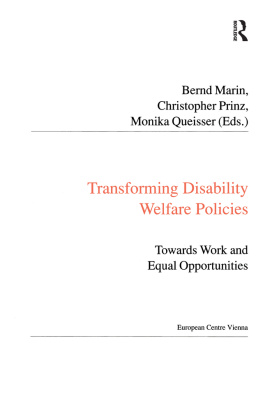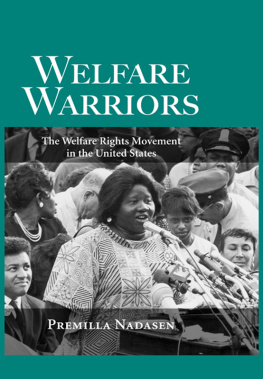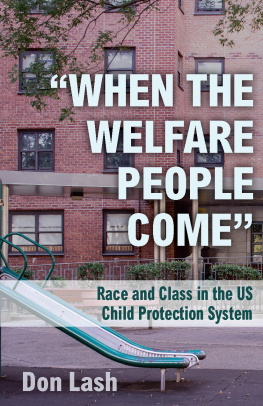
First published 2002 by Ashgate Publishing
Reissued 2018 by Routledge
2 Park Square, Milton Park, Abingdon, Oxon OX14 4RN
711 Third Avenue, New York, NY 10017, USA
Routledge is an imprint of the Taylor & Francis Group, an informa business
Copyright Kirstein Rummery 2002
All rights reserved. No part of this book may be reprinted or reproduced or utilised in any form or by any electronic, mechanical, or other means, now known or hereafter invented, including photocopying and recording, or in any information storage or retrieval system, without permission in writing from the publishers.
Notice:
Product or corporate names may be trademarks or registered trademarks, and are used only for identification and explanation without intent to infringe.
Publishers Note
The publisher has gone to great lengths to ensure the quality of this reprint but points out that some imperfections in the original copies may be apparent.
Disclaimer
The publisher has made every effort to trace copyright holders and welcomes correspondence from those they have been unable to contact.
A Library of Congress record exists under LC control number: 2001099944
ISBN 13: 978-1-138-73862-1 (hbk)
ISBN 13: 978-1-315-18465-4 (ebk)
Contents
This book is a synthesis of theory and research which takes a critical look at the experiences of disabled people accessing and receiving community care services. It has its roots in a Joseph Rowntree funded research project at the University of Birmingham in 1995-1996 which was designed to look at the ways in which disabled people gained access to community care assessments and services (Davis et al, 1997). The bulk of this book is based on analysis of that study data, which comprised of two main sources: ethnographic observations of assessment practice in six social work teams from two local authorities; and in-depth interviews with 46 disabled people and 16 of their family members/friends/supporters who had been through a community care assessment. However, the ideas discussed in this book were developed further after that study, particularly in the light of a Department of Health funded study at the University of Manchester in 1997-1999, designed to look at the experiences of disabled people with complex health and social care needs who used direct payments rather than conventional community care services (Glendinning et al, 2000).
The book develops a citizenship framework of civil and social rights, which is based on seminal work done by Marshall (1992), Plant (1990, 1992), Lister (1995, 1997), Turner (1993a) and Doyal and Gough (1991) among others. It uses that framework to examine the effect of the community care assessment process on the citizenship status of disabled people and their families. For the purposes of this book, citizenship status has three dimensions: the protection or otherwise of a persons civil and social rights (Marshall, 1992); whether or not they are treated as and enabled to act as competent members of society (Turner, 1993a); and whether the process facilitates or prevents disabled peoples minimally curtailed social participation (Doyal and Gough, 1991). Chapters one, two and three discuss this framework in more detail.
The ways in which frontline welfare professionals/gatekeepers/ bureaucrats (Klein et al, 1996; Lipsky, 1980) make decisions about who gets access to community care assessments and services, and the impact of these decisions on the citizenship status of disabled people and their families is discussed in chapter four. The ways in which disabled people and their families experience the process of attempting to gain access to assessments and services in the community care process is discussed in chapter five. The remainder of the book is devoted to exploring the effects of the outcome of the community care process on the citizenship status of disabled people and their families, and discussing the relevance of the findings on community care policy. It examines whether there is a case to be made for the adoption of a welfare rights approach to community care for disabled people and their families.
A Quick Note About Terminology
Throughout this book reference is consciously made to disabled people and their families. Whilst this is not terminology that would necessarily be used by the people concerned, it is preferable to any of the alternatives (such as service users, disabled and older people, carers). The people whose experiences form the core of this book had undergone a community care assessment of their needs, and they were mostly people with impairments who were disabled by the social, attitudinal, physical and environmental barriers facing them in society (Oliver, 1990), and whilst their impairments varied they had sufficient commonality of experience to be referred to as disabled. However, for some people their age did make a difference to how they were treated by social services departments, and where this is the case throughout the text they are referred to as Older disabled people. The term carers has been largely been avoided, partly because it is problematic for many disabled people (Morris, 1997) who point out that it ignores the fact that many disabled people themselves have caring responsibilities, which is supported by the evidence in the book. The phrase disabled people and their families is therefore used, with one exception. For practitioners carrying out community care assessments there was a clear distinction between the disabled person on the one hand and the carer on the other, and this affected their practices and decision making in several key ways which are discussed in the relevant chapters. Where it is necessary for clarity to highlight these differences (essentially the difference between the person who is nominally the focus of the assessment and the rest of the family) the person not the subject of the assessment from the practitioners point of view is called the carer.
Most good social policy research and theory is the result of years of work done by hardworking teams and this book is no exception to that. I am indebted to Ann Davis and Kathryn Ellis who designed the original Joseph Rowntree project and were very generous in allowing me to use the data to develop and test my own theories. I also owe personal and intellectual thanks to colleagues at the National Primary Care Research and Development Centre, University of Manchester who helped me develop my ideas using their data, particularly Caroline Glendinning, Sally Jacobs, Shirley Halliwell and Ruth Young, and to Lisa Tilsley who gave invaluable technical assistance with the manuscript. An intellectual debt is owed to the participants of the various conferences and ESRC seminars at which I discussed the ideas developed in this book.
This book would not have been possible without the involvement of the practitioners who allowed me to observe their practice and the disabled people and their families who took part in interviews. Their insights still inform my work today and I am very grateful. Finally, personal thanks are owed to Simon and Euan Lippmann, without whose co-operation this book would never have left the ground, and Wendy Macdonald and the Bitches on Diets who gave it wings, and Caroline and Adam Povey who babysat and stocked up the fridge when it mattered the most.



